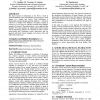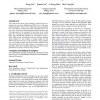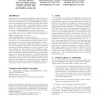APWEB
2004
Springer
14 years 5 months ago
2004
Springer
This paper presents a web page fragmentation technique, which is utilized for extracting specific parts of web pages and building personalized portals using these fragments. It is ...
WIDM
2004
ACM
14 years 5 months ago
2004
ACM
Many applications which use web data extract information from a limited number of regions on a web page. As such, web page division into blocks and the subsequent block classifica...
W4A
2004
ACM
14 years 5 months ago
2004
ACM
Specifications for accessibility of Web page do not necessarily guarantee a usable or satisfying Web experience for persons with disabilities. The needs of many of these individua...
SIGIR
2004
ACM
14 years 5 months ago
2004
ACM
The larger amount of information on the Web is stored in document databases and is not indexed by general-purpose search engines (i.e., Google and Yahoo). Such information is dyna...
SIGIR
2004
ACM
14 years 5 months ago
2004
ACM
In this poster we present an overview of the techniques we used to develop and evaluate a text categorisation system for the PRINCIP project which sets out to automatically classi...
SIGIR
2004
ACM
14 years 5 months ago
2004
ACM
Link Analysis has shown great potential in improving the performance of web search. PageRank and HITS are two of the most popular algorithms. Most of the existing link analysis al...
ASSETS
2004
ACM
14 years 5 months ago
2004
ACM
Bookmarks are shortcuts that enable quick access of the desired Web content. They have become a standard feature in any browser and recent studies have shown that they can be very...
ICNC
2005
Springer
14 years 5 months ago
2005
Springer
We introduce a new method to improve web site text content by identifying the most relevant free text in the web pages. In order to understand the variations in web page text, we c...
ICADL
2005
Springer
14 years 5 months ago
2005
Springer
This paper proposes a method for creating a high quality collection of researchers’ homepages. The proposed method consists of three phases: rough filtering of the possible web p...
CIKM
2005
Springer
14 years 5 months ago
2005
Springer
Depending on a web searcher’s familiarity with a query’s target topic, it may be more appropriate to show her introductory or advanced documents. The TREC HARD [1] track defi...



